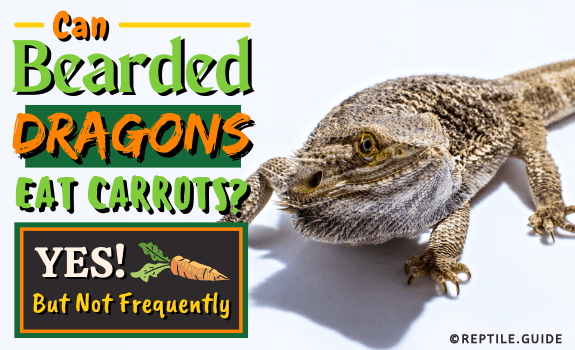Carrots are safe, but not necessarily healthy for bearded dragons.
Bearded dragons can eat carrots once or twice each week but not every day.
Carrots contain many useful vitamins and minerals which can be beneficial to your bearded dragon and are one of the safer vegetables to feed to your pet.
As with most things, there are some risks to overfeeding carrots. Let’s take a closer look at the pros and cons.
In This Article
Can Bearded Dragons Eat Carrots?
Yes, bearded dragons can eat carrots.
In the wild bearded dragons are unlikely to eat many root vegetables. They’re not the sort of animals that dig up their food (for the most part).
Since carrots aren’t native plants in the Australian wilderness, they’re not a natural part of a beardie’s diet.
However, although carrots have the wrong calcium to phosphorus ratio they’re less toxic than some other vegetables.
You can feed your bearded dragon carrots once or twice a week without creating health issues for your pet..
A Note About Baby Carrots
Carrots make an excellent addition to your bearded dragon’s diet and have many health benefits.
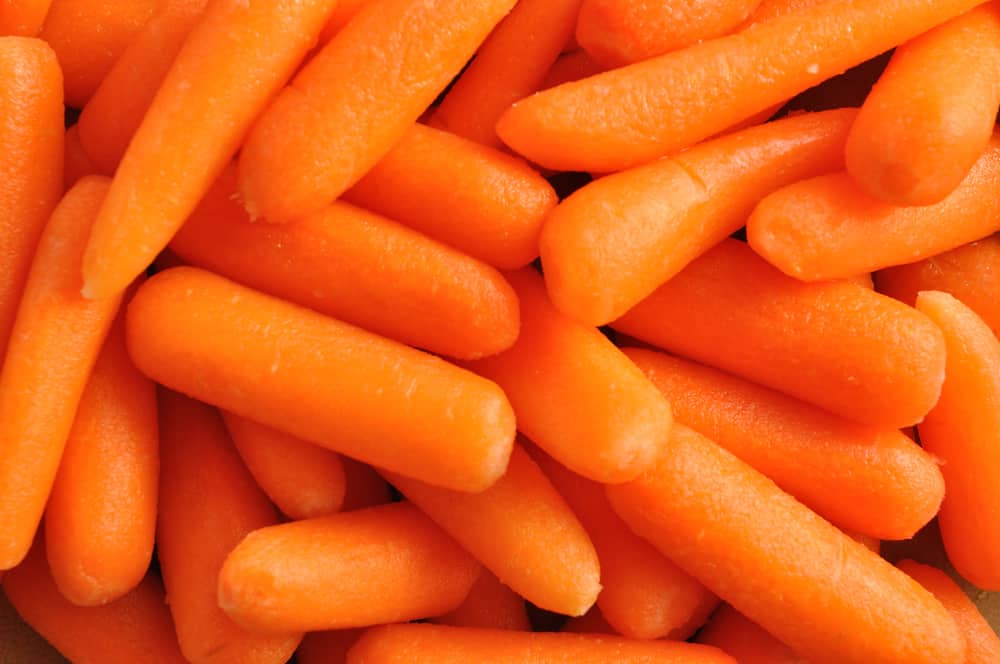
However, it’s best to avoid feeding your bearded dragons baby carrots.
Baby carrots undergo an intensive array of treatments before packaging. Among them is a chlorine bath which could be toxic to a bearded dragon.
Although this isn’t true for all brands, many places treat baby carrots with preservatives to help them keep looking fresh.
While these chemicals make the baby carrots look more appealing, they’re toxic to your bearded dragons.
Most responsible dragon owners avoid letting their dragons eat baby carrots.
We recommend avoiding baby carrots and feeding your beardie regular carrots.
How to Feed Carrots to Your Bearded Dragon
You can feed carrots to your bearded dragon with little preparation.
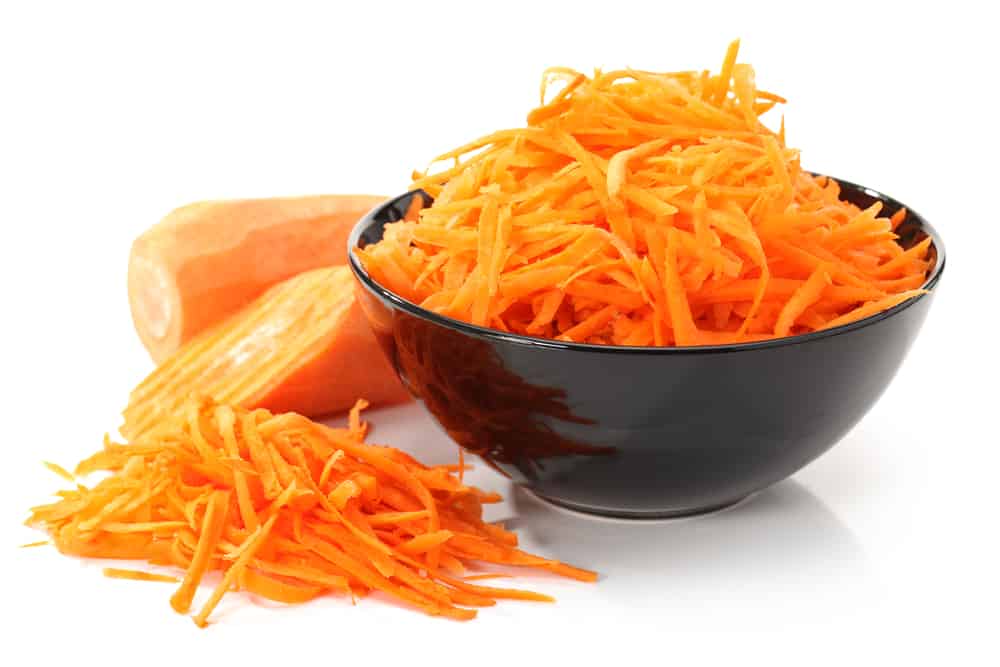
Here’s a step-by-step guide to preparing raw carrots for your dragon:
- Check that the carrot is healthy and doesn’t show any signs of diseases like rust or pest damage.
- Wash the carrots, ensuring that you remove all dirt and any slimy outer layer.
- Use a knife to cut off the carrot’s top and any blemishes in the carrot.
- Use a small grater to grate the carrot into small strings. A small to medium-sized grater which gives you strings is best. This shape is easiest for bearded dragons to grasp and eat.
- Place the carrots in a shallow bowl with the other veggies that your bearded dragon will be eating.
- Dust the entire salad with a high-quality calcium supplement to help provide the bearded dragon with the appropriate ratio of phosphorus to calcium.
- Place the salad in the enclosure so your bearded dragon can eat.
If you want to give cooked carrots to your bearded dragons, you can follow these steps:
- Follow steps one to three for preparing raw carrots.
- Cut the carrot into tiny cubes that your bearded dragons can pick up and swallow.
- Place the carrots into a small pot, and add enough clean water to cover the carrots.
- Put the stove on medium heat, and put your pot on the stove.
- Allow the water to come to a rolling boil, then turn down the heat.
- Use a fork to stab the carrots and see when they’re cooked. They should be soft, and the fork should go into them without effort.
- Remove the pot of cooked carrots from the stove and drain the contents through a colander.
- Allow the carrots to cool, then give your bearded dragon carrots with other vegetables and topped with calcium powder.
Nutritional Value of Carrots
When your bearded dragons eat carrots, they ingest a wide variety of different minerals and nutrients.
According to the FDA, a 100g portion of raw carrots contains the following:
- 90.1 grams of water
- 4.2 grams of sugar
- 33 mg of calcium
- 31 mg of phosphorus
- 2.2 mg of vitamin C
- 0.088 mg of vitamin B6
- 872 micrograms of vitamin A
- 15 micrograms of vitamin K
- 8,285 micrograms of beta-carotene
Can Baby Bearded Dragons Eat Carrots?
Can baby bearded dragons eat carrots?
Baby bearded dragons can eat small amounts of carrots.
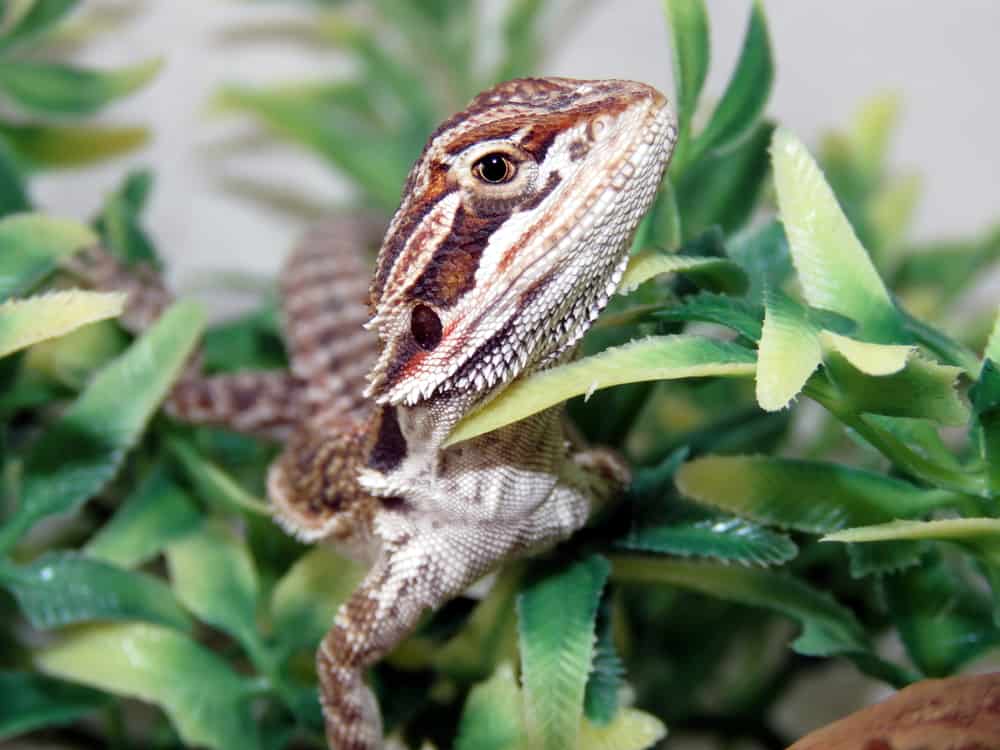
When you give your baby beardie carrots, you can give it around one-quarter of a medium-sized carrot.
While the beta-carotene and other vitamins in raw carrots are good for babies, don’t give them carrots more than once a week.
Preparing carrots for babies is the same as for a large bearded dragon.
Can Bearded Dragons Eat Carrot Tops?
Yes, bearded dragons can eat carrot tops.
Much like leafy greens, these carrot tops make an invaluable and inexpensive food source for the bearded dragon owner.
Carrot tops contain high amounts of the following nutrients:
- Calcium
- Iron
- Vitamin A, C, and K
To avoid Vitamin A toxicity, only add carrot tops to your pets’ diet occasionally.
Sometimes people also ask, can bearded dragons eat carrot greens? Greens and tops are the same thing, so yes they can.
Can Bearded Dragons Eat Carrot Skin?
Yes, bearded dragons can eat carrot skin.
A carrot’s skin contains many of the unique vitamins and minerals that carrots have to offer.
Most bearded dragon owners prefer not to peel the carrots for their beardies.
We recommend giving your bearded dragon raw carrots with the skin on them so they can get as many nutrients as possible.
Cooked carrots offer the advantage of making beta-carotene easier to absorb, but you should leave the skin on.
Can Bearded Dragons Eat Carrots Raw?
Yes, bearded dragons can eat raw carrots.
As some of the nutrients found in carrots are temperature-sensitive, you should give your dragon raw carrots.
When feeding raw carrots to your bearded dragon, remember to grate the carrot and mix it with vegetables like leafy greens.
Can Bearded Dragons Eat Cooked Carrots?
Bearded dragons can eat cooked carrots as long as they’re only boiled.
DON’T cook carrots for your beardie with oil or in water with salt. It’s best to just boil the carrot in clean water.
Pros of Feeding Carrots to Your Bearded Dragon
When given in moderation, Bearded dragons can eat carrots and benefit from the vitamins and minerals present.
The advantages of eating carrots include:
- Carrots contain Beta-carotene and other minerals in moderate amounts.
Carrots are high in nutrients like vitamin C and vitamin B6, which are essential to a dragon’s health.
Beta carotene and Vitamin A (in trace amounts) also help your bearded dragon to maintain a healthy immune system.
- Carrots are high in fiber.
Fiber is essential in the diets of most animals as it helps keep the digestive system operating as it should.
- Carrots have low sugar content.
Unlike many fruits and vegetables, your bearded dragon won’t overdose on sugar if you feed it too many carrots.
These animals have little resistance to sugar, so feeding your beardie carrots as a low-sugar treat is an excellent idea.
Cons of Feeding Bearded Dragons to Your Bearded Dragon
Bearded dragons can eat carrots, and many beardie owners give their pets carrots for the nutritional benefits.
However, feeding your bearded dragon too many carrots can be harmful to its health. Let’s look at some potential disadvantages.
- Vitamin A toxicity.
You want to ensure that your bearded dragon’s diet contains a diverse amount of nutrients and vitamins.
However, too much vitamin A can be quite toxic to a bearded dragon.
This is because, when present in large amounts, vitamin A starts to absorb calcium from the beardie’s bones.
Unlike the problems caused by metabolic bone disease, vitamin A doesn’t stop the bearded dragon from forming strong bones but draws calcium from the bones, causing osteoporosis.
Carrots contain high amounts of vitamin A, so you don’t want to feed your beardie carrot more than twice a week.
Some bearded dragon owners recommend only feeding carrots up to seven times a month.
- The wrong ratio of calcium to phosphorus.
Bearded dragons have specific needs when it comes to the proportion of calcium to phosphorus. Specifically, a bearded dragon diet should contain twice as much calcium as phosphorus.
Carrots contain nearly as much phosphorus as they do calcium. The problem can partially be addressed by using a high-quality calcium supplement, but that won’t fully solve the issue.
An incorrect ratio fed for extended periods can lead to health problems like metabolic bone disease or the lack of a healthy immune system.
If you add carrots to your bearded dragon’s diet in moderate amounts, along with other greens and veggies, this shouldn’t be a problem.
- Carrots contain large amounts of oxalates.
The oxalates are a family of acids that, while not harmful in small amounts, can be harmful to your bearded dragon at high levels.
If your bearded dragons do eat carrots too regularly, they may suffer from a buildup of oxalic acid.
In large amounts, carrot plant leaves can affect the immune system and degrade the bones.
It’s worth noting that bearded dragons can eat either raw or cooked carrots, and carrots lose some of their oxalates when boiled.
While boiling carrots may remove some negative effects of the oxalates, it also removes some nutritional benefits.
What Other Vegetables Can I Feed to my Bearded Dragon?
Along with feeding your bearded dragons carrots, many other veggies can form part of their overall diet.
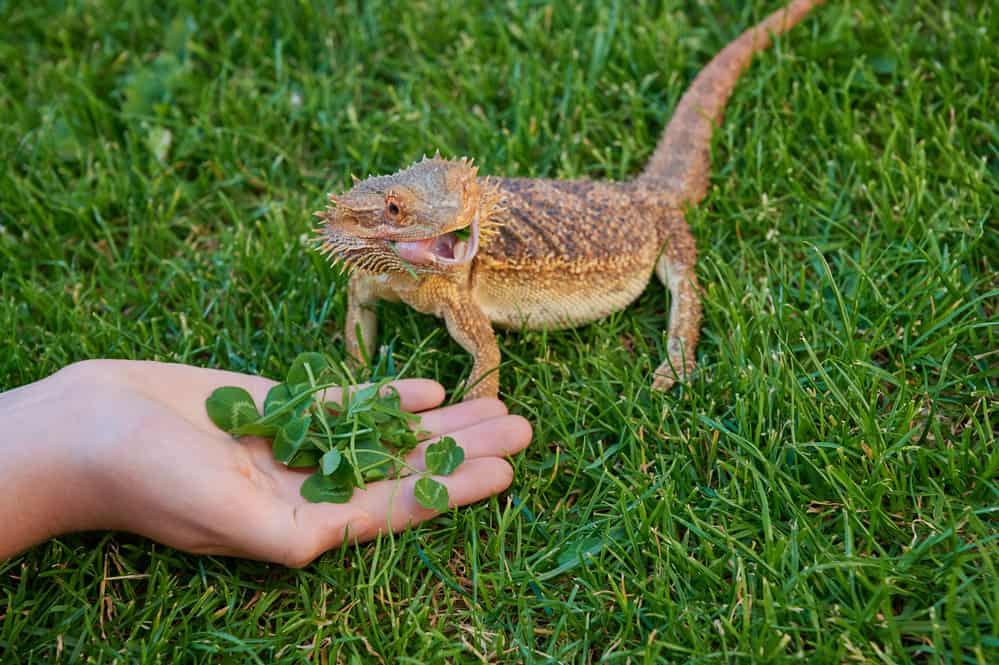
Some of the most common vegetable-related questions include:
- Can bearded dragons eat cauliflower?
Bearded dragons can have around 6-10 grams of cauliflower a month.
- Can bearded dragons eat broccoli?
Yes, in small amounts and only once a month.
- Can bearded dragons eat cabbage?
Yes! Your bearded dragon can have cabbage once a week.
- Can bearded dragons eat tomatoes?
Your bearded dragon can have two grape tomatoes or one-quarter of a small tomato once every two weeks.
- Can bearded dragons eat spinach?
Yes, beardies can have spinach on occasion. Spinach has an excellent calcium to phosphorus ratio but is also heavy on oxalates.
- Can bearded dragons eat cucumbers?
Yes, but only in small servings every other week.
- Can bearded dragons eat watercress?
Yes, beardies can occasionally have watercress (it contains high amounts of oxalates).
- Can bearded dragons eat eggplant?
Yes, as a treat (in small amounts with the seeds and skin removed).
- Can bearded dragons eat endives?
Yes, they can! Endives (or escaroles) have a high ratio of calcium to phosphorus which is excellent for your bearded dragon.
- Can bearded dragons eat rockets?
Yes, some beardies love rockets, and they can eat this green often.
- Can bearded dragons eat radishes?
Yes, they can eat radishes which contain many wonderful nutritional benefits. Radish greens are better for your beardie, and you can give them to them multiple times a week.
As a general rule of thumb, vegetables that are the flower (like broccoli or cauliflower) or fruit (like eggplants or tomatoes) of the plant should be no more than an occasional treat.
Vegetables that are the plant’s leaf (like watercress and endives) are generally safer for frequent consumption.
You should always research the specific vegetable in question before feeding it to your bearded dragon.
Many fruits and vegetables have a high phosphorus content which can lead to metabolic bone disease.
Feeding Your Bearded Dragon A Balanced Diet
Bearded dragons require a diet that consists of far more than carrots. To keep your dragon healthy, you need to ensure that it eats many other foods.
Young beardies require a diet of around 80% protein and 20% vegetable and fruit content.
In adult beardies, over one year old, the reverse is true. They need 80% vegetables and 20% protein.
No matter what the age of your beardie, fruits should make up no more than one-fifth of your bearded dragon’s diet.
Most fruits contain high amounts of sugar, which can lead to obesity and fatty liver disease.
Leafy greens should make up the largest portion of the vegetable component of a dragon’s diet. Possible choices include:
- Kale
- Basil
- Celery
- Cilantro
- Bok choy
- Grape leaves
- Collard greens
- Mustard greens
- Dandelion leaves
- Rocket and arugula
- Turnip and radish greens
- Endives, escarole, and radicchio
The second most important element of a beardie’s diet is live foods. Some of the best options for these lizards include:
- Crickets
- Earthworms
- Superworms
- Black soldier fly larvae
As time goes by, hobbyists are discovering other types of protein-rich live foods that might be beneficial. Keep your eye out for new arrivals on the market.
When choosing live foods for your pet, avoid waxworms and mealworms, which have high-fat contents and lead to obesity.
Fruits should make up the smallest component of the dragon’s diet. Some of the options include:
- Pears
- Dates
- Apples
- Peaches
- Mangos
- Papayas
- Apricots
- Bananas
- Strawberries
Since you can only feed some fruits and vegetables to your bearded dragon on occasion, we suggest keeping a feeding notebook.
Keeping a notebook allows you to track what your pet has been eating, and when.
Always dust your dragon’s food with a high-quality calcium supplement to help keep a.
Dragons can suffer from many diseases if they don’t get a balanced diet, so give them the most balanced diet that you can.
For more information about how much to feed your bearded dragons, check out our article about how often to feed bearded dragons.
We also have a comprehensive guide to bearded dragon care, which can help you take the best possible care of your beardie.
Does your bearded dragon enjoy carrots? Let us know in the comments.
